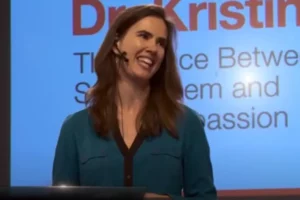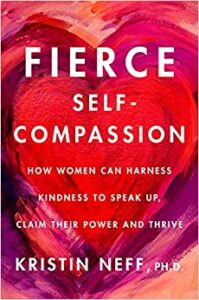Podcast: Play in new window | Download (Duration: 1:01:30 — 42.2MB)
Subscribe: Apple Podcasts | Spotify | Amazon Music
Self-compassion has gotten a bad rap, it's time to update your perspective on this key tool to security.
We've been socialized to associate compassion with femininity, self-love, and gentleness, and self-compassion as a way of saying to be “nice” to yourself – basically a recipe to get walked on. Dr. Kristin Neff has dedicated years of research to help understand, update and restructure the ideas around weakness so that all genders can harness the power of having a self-compassionate stance.
Join Dr. Kristin Neff and Co-host Dr. Ann Kelley as they explore the world of fierce self-love.
Embracing Fierce Self-Compassion
“Women have lower self-compassion levels than men because we're socialized to give compassion to others and to be self-sacrificing. We feel less entitled to meet our own needs than men do.” Kristin Neff
Join our Therapist Uncensored online community as a TU Neuronerd and help support getting this content out to the world. For deeper dives into topics and extra episodes, join our online community for as little as $5 a month and get deep-dive content, ad-free feed, discounts on anything we produce, and unique study opportunities.
For deeper dives into topics and extra episodes, join our online community for as little as $5 a month and get deep-dive content, ad-free feed, discounts on anything we produce, and unique study opportunities.
About Dr. Kristin Neff

Dr. Kristin Neff
Dr. Kristin Neff is a pioneer in the field of self-compassion research, who has dedicated her life to understanding and educating others on their journey to fierce self-love. Neff earned her doctorate from the University of California at Berkeley and is currently an Associate Professor of Educational Psychology at the University of Texas at Austin.
In addition to writing numerous academic articles and book chapters on the topic, she is the author of the book Self-Compassion: The Proven Power of Being Kind to Yourself, along with her newest release – Fierce Self-Compassion: How Women Can Harness Kindness to Speak Up, Claim Their Power and Thrive. In conjunction with her colleague Dr. Chris Germer, she has developed an empirically supported training program called Mindful Self-Compassion, which is taught by thousands of teachers worldwide. They co-authored The Mindful Self-Compassion Workbook as well as Teaching the Mindful Self-Compassion Program: A Guide for Professionals. She is also co-founder of the nonprofit Center for Mindful Self-Compassion.
Time Stamps
00:18 – Why Neff shifted her research towards women
1:13 – Fierce self-compassion
2:09 – How men are harmed by their inability to be tender
7:13 – How it connects to the sympathetic nervous system
11:28 – Neff's 3-step model
13:59 – Research on self-compassion
21:22 – Biology or socialization?
32:18 – Why we are “afraid” to appreciate ourselves
50:29 – Positives and negatives of feeling anger
58:16 – Inner compassion
Resources

Dr. Kristin Neff – Her main website loaded with free resources and MP3's
Center for Mindful Self-Compassion
Mindful Self-Compassion Intensive Workshop
The Mindful Self-Compassion Workbook
Teaching the Mindful Self-Compassion Program: A Guide for Professionals
Self-Compassion: The Proven Power of Being Kind to Yourself
Fierce Self-Compassion: How Women Can Harness Kindness to Speak Up, Claim Their Power and Thrive
Kristen Neff: Self Compassion Step by Step, The Proven Power of Being Kind to Yourself (Audio CD)
Karen Bluth, forward by Kristin Neff: The Self-Compassion Workbook for Teens
Jean M Twenge and W. Keith Campbell: The Narcissism Epidemic Living in the Age of Entitlement
Want more on this topic? You'll probably enjoy these previous episodes from Therapist Uncensored
Building Grit Through Self Compassion with Dr. Kristin Neff – Episode 23
Sue and Ann Explore Self Criticism and Internal Scripts – Episode 169
View Show Transcript Here
Value this content? Please take a moment to leave us a rating and review wherever you get your podcasts to help others discover this resource, and share with those you think can benefit.














